
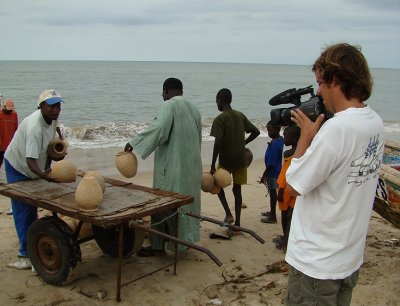 With "Kayar – a childhood caught in the nets", based on the life of artisanal fishermen in the third port in Senegal, the French filmmaker Thomas Grand offers a fascinating as well as oppressive portrait of the drama of this lively fishing town. The film describes the life and prospects of Adama, a boy turned fisherman. Kayar does not have a nursery school and a very limited capacity in primary schools. The film shows this harsh reality, where many children must return home after failing to find a place. The film is based on an extensive research of about three years which allowed precise targeting of awareness about the challenges and preparing the emergence of new initiatives to address these critical issues experienced in Kayar. Thomas Zadrozny reviews the film and interviews the film director. Read more.
With "Kayar – a childhood caught in the nets", based on the life of artisanal fishermen in the third port in Senegal, the French filmmaker Thomas Grand offers a fascinating as well as oppressive portrait of the drama of this lively fishing town. The film describes the life and prospects of Adama, a boy turned fisherman. Kayar does not have a nursery school and a very limited capacity in primary schools. The film shows this harsh reality, where many children must return home after failing to find a place. The film is based on an extensive research of about three years which allowed precise targeting of awareness about the challenges and preparing the emergence of new initiatives to address these critical issues experienced in Kayar. Thomas Zadrozny reviews the film and interviews the film director. Read more.
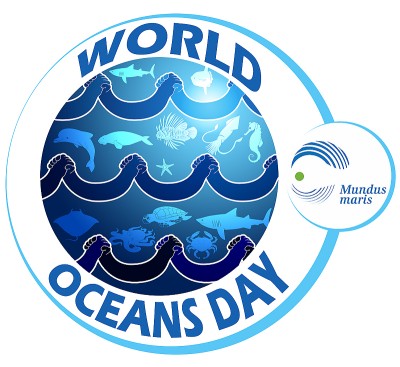 We are all connected to the ocean! Participate in World Ocean Day contest and win a 2015 Mundus maris Award! - Extension to 10 May!
We are all connected to the ocean! Participate in World Ocean Day contest and win a 2015 Mundus maris Award! - Extension to 10 May!
Nous sommes tous connectés à l'Océan! Participez au concours de la Journée mondiale de l'océan et gagnez un Prix Mundus maris 2015! - Prolongation jusqu'au 10 mai!
Wir sind alle mit dem Meer verbunden! Beteiligt Euch am World Oceans Day Wettbewerb und gewinnt einen 2015 Mundus maris Preis! - Verlängerung bis zum 10. Mai!
Siamo tutti collegati al mare! Partecipate al concurso per il World Oceans Day e vincete un Premio Mundus maris 2015! - Prolunga fino al 10 maggio!
Todos estamos conectados con el océano! ¡Participen en el concurso del Día Mundial de los Océanos y ganen un Premio Mundus maris 2015! - extensión al 10 de mayo!
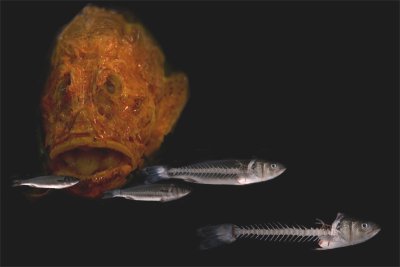 "Ten percent of the big fish still remain. There are still some blue whales. There are still some krill in Antarctica. There are a few oysters in Chesapeake Bay. Half the coral reefs are still in pretty good shape, a jeweled belt around the middle of the planet. There's still time, but not a lot, to turn things around."
"Ten percent of the big fish still remain. There are still some blue whales. There are still some krill in Antarctica. There are a few oysters in Chesapeake Bay. Half the coral reefs are still in pretty good shape, a jeweled belt around the middle of the planet. There's still time, but not a lot, to turn things around."
Sylvia Earle, marine scientist and winner of the TED Prize 2009. Her wish was to join her in protecting the vital blue heart of the planet.
Citation selected by Daniele d'Antonio, interview title: save the little fish today or you won't have big fish tomorrow! - Read more.
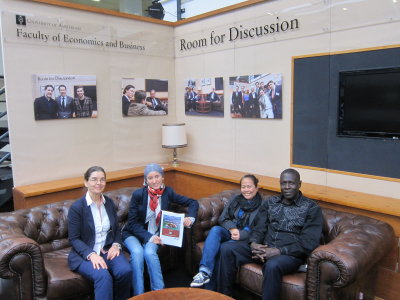 This panel organised by Mundus maris at the VII MARE Conference in Amsterdam explored the coping strategies of artisanal fisheries in different parts of the world as they try to retain some of their traditions and social control over economic actors with their role in a globalised market of fisheries products, but also the increasing competition for access to coastal space with tourism and other developments. Two countries/regions were discussed in a comparative manner to teeth out local specifics from global trends which could inform policy: Senegal in West Africa and the Philippines in Southeast Asia. Underlying the exploration were results from a quantitative reconstruction of catches of the small scale fisheries in both countries as part of the global effort of the Sea Around Us Project, which are a contribution to rectifying widespread misled perceptions of the marginality of ‘traditional’ or artisanal fisheries. Read more.
This panel organised by Mundus maris at the VII MARE Conference in Amsterdam explored the coping strategies of artisanal fisheries in different parts of the world as they try to retain some of their traditions and social control over economic actors with their role in a globalised market of fisheries products, but also the increasing competition for access to coastal space with tourism and other developments. Two countries/regions were discussed in a comparative manner to teeth out local specifics from global trends which could inform policy: Senegal in West Africa and the Philippines in Southeast Asia. Underlying the exploration were results from a quantitative reconstruction of catches of the small scale fisheries in both countries as part of the global effort of the Sea Around Us Project, which are a contribution to rectifying widespread misled perceptions of the marginality of ‘traditional’ or artisanal fisheries. Read more.
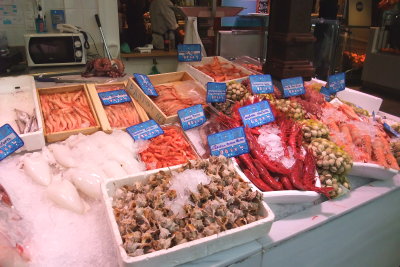
Will we still be able to eat swordfish, tuna loins, tasty grouper, octopus and native mussels and oysters from near home or will we eat jellyfish burger in the future? What can we learn from the culinary seafood traditions and the culture of the many nationalities that have developed a love for the sea and its food? Quite a few have also settled in Brussels and Belgium leaving a stamp on the eating habits of the European capital. This is the beginning of a series of invited articles and activities, which we will feature in 2012, in the occasion of the year of gastronomy in Brussels, 'Brusselicious', and the growing attention to issues of food, culture and food security further afield. Read more.
 Mundus maris - Sciences and Arts for Sustainability asbl has stepped up participation in the 2012 agenda of Campus Plein Sud at the Free University of Brussels (ULB). This time, we organised or participated in four successful events. The theme in the tenth year of existence focuses again on water and sustainability issues, this time with particular attention to climate change. From its beginning, the ambition of Campus Plein Sud was to inform the campus community of the many facets of development "in the global South" so as to replace the caricature of misery or exoticism often painted by the media with more nuanced understanding. The climate change and global trade and sustainability perspectives forcefully illustrates global interdependencies. Read more.
Mundus maris - Sciences and Arts for Sustainability asbl has stepped up participation in the 2012 agenda of Campus Plein Sud at the Free University of Brussels (ULB). This time, we organised or participated in four successful events. The theme in the tenth year of existence focuses again on water and sustainability issues, this time with particular attention to climate change. From its beginning, the ambition of Campus Plein Sud was to inform the campus community of the many facets of development "in the global South" so as to replace the caricature of misery or exoticism often painted by the media with more nuanced understanding. The climate change and global trade and sustainability perspectives forcefully illustrates global interdependencies. Read more.
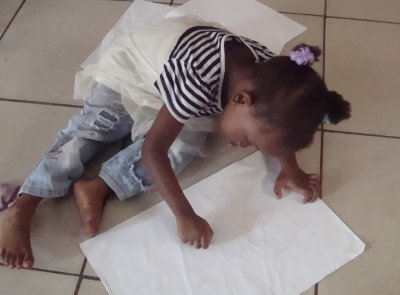 Working with a school teacher and other interested people, including Dr Okonofua U.A., Fine Arts Department at the University of Uyo, Foluke Akinmoladun, Kenny Odili and Tammy Daka successfully organised a get togetherin November 2012 in Port Harcourt, Nigeria, with children and youth to participate in the names-giving contest for the Mundus maris contest. From the smallest kids in pre-school age to some teenagers, a sense of engagement and expectation reigned among all participants. What happens to the babyfish? How best to protect them? What could be the names that best characterise courage, wit and love for life? These and other questions were asked and translated into drawings and suggestions to respond to the invitation of Mundus maris. Read more.
Working with a school teacher and other interested people, including Dr Okonofua U.A., Fine Arts Department at the University of Uyo, Foluke Akinmoladun, Kenny Odili and Tammy Daka successfully organised a get togetherin November 2012 in Port Harcourt, Nigeria, with children and youth to participate in the names-giving contest for the Mundus maris contest. From the smallest kids in pre-school age to some teenagers, a sense of engagement and expectation reigned among all participants. What happens to the babyfish? How best to protect them? What could be the names that best characterise courage, wit and love for life? These and other questions were asked and translated into drawings and suggestions to respond to the invitation of Mundus maris. Read more.
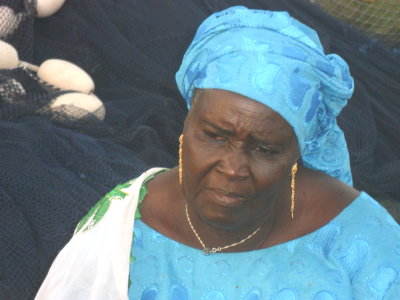 Look behind the scenes of the traditional fishing village Guet Ndar, Saint Louis, Senegal. The leader of the women active in the traditional fishery and strong personality in the community is Awa SEYE. Follow her through the interview, discover her working environment and social struggles and talk to the real persona. Her rise from a down-trodden woman suffering loss of several babies in child birth to a leading midwife, community organiser and successful defender of the women's access rights to their working spaces on the beach against tourism developpers cast some light on what can be achieved with determination, social responsibility and civic engagement. As part of the Mundus maris contribution to the 2013 edition of Campus Plein Sud at the ULB, join the cine-débate in the open course of Prof. Gemenne, Wednesday, 13 March, from 17h00 to 18h00 in Room AY2.108 - Solbosch Campus. Read more (p. 4).
Look behind the scenes of the traditional fishing village Guet Ndar, Saint Louis, Senegal. The leader of the women active in the traditional fishery and strong personality in the community is Awa SEYE. Follow her through the interview, discover her working environment and social struggles and talk to the real persona. Her rise from a down-trodden woman suffering loss of several babies in child birth to a leading midwife, community organiser and successful defender of the women's access rights to their working spaces on the beach against tourism developpers cast some light on what can be achieved with determination, social responsibility and civic engagement. As part of the Mundus maris contribution to the 2013 edition of Campus Plein Sud at the ULB, join the cine-débate in the open course of Prof. Gemenne, Wednesday, 13 March, from 17h00 to 18h00 in Room AY2.108 - Solbosch Campus. Read more (p. 4).
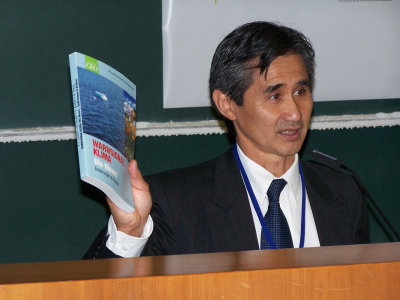 Dr. José Lozán is a long-term guest scientist from Peru working at the University of Hamburg. During his work at the university he has been particularly concerned with making the best science about water, the oceans and our climate available to young people and the public at large. The last public symposium he organised from 20 to 22 September 2011 was part of the high-level events of the now well-known Hamburg Climate Weeks. Mundus maris contributed to the latest activities co-organised by Dr. Lozán and interviewed him to learn more. Read more.
Dr. José Lozán is a long-term guest scientist from Peru working at the University of Hamburg. During his work at the university he has been particularly concerned with making the best science about water, the oceans and our climate available to young people and the public at large. The last public symposium he organised from 20 to 22 September 2011 was part of the high-level events of the now well-known Hamburg Climate Weeks. Mundus maris contributed to the latest activities co-organised by Dr. Lozán and interviewed him to learn more. Read more.
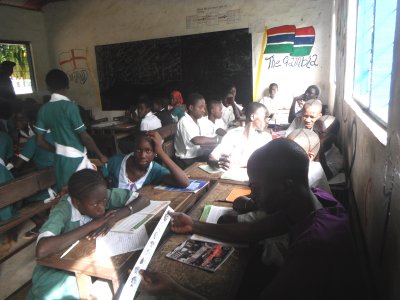 Education is always about the future. “Global education” is a relatively new concept still in mutation, which examines what should be contents and modes of teaching to prepare young people in different parts of the planet for living peacefully and in synch with themselves, with each other and with nature.
Education is always about the future. “Global education” is a relatively new concept still in mutation, which examines what should be contents and modes of teaching to prepare young people in different parts of the planet for living peacefully and in synch with themselves, with each other and with nature.
A key challenge is how to develop contents and processes that enable young people to build up the competence and skills to live well and perform in their local environments, while being aware and capable of putting the local requirements and opportunities into broader, global perspectives. Read more.
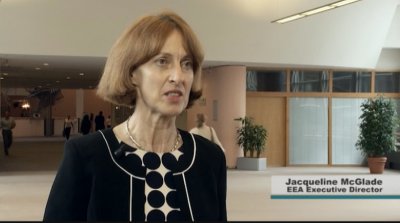 Jacqueline McGlade, Executive Director of the European Environment Agency, is a marine biologist and an environmental informatics professor. She answers questions on the major threats to the oceans and what we can do about them. The questions were put together by Mundus maris asbl as a result of a public consultation. The interview is the first in a series of interviews with personalities in the sciences and arts sharing their views on why it is important to protect the oceans and what can be done to do it more effectively. Click on the photo to see the interview on the Mundus maris channel.
Jacqueline McGlade, Executive Director of the European Environment Agency, is a marine biologist and an environmental informatics professor. She answers questions on the major threats to the oceans and what we can do about them. The questions were put together by Mundus maris asbl as a result of a public consultation. The interview is the first in a series of interviews with personalities in the sciences and arts sharing their views on why it is important to protect the oceans and what can be done to do it more effectively. Click on the photo to see the interview on the Mundus maris channel.







